- Home
- Joseph Bruchac
Brothers of the Buffalo Page 22
Brothers of the Buffalo Read online
Page 22
“Tonkawas,” Quanah replied. “They help the Tai-bos fight us. They killed my friend, the one who grew up with me. There by the Double Mountain fork of the Brazos. Then they ate him. It makes my heart hot to think of them.”
Fighting the Tonkawas. Many began to nod their heads. That would be a good thing to do. The Tonkawas were a common enemy to all of those gathered.
Then someone called out. His voice spoke pure Comanche. It was loud and clear as the beat of a drum.
“Quanah! These old men want to see you over here!”
Wolf turned. There stood two old Comanche men, White Wolf and Old Man Otter Belt. They were respected Comanche elders.
Quanah walked over to them.
“You are a good fighter,” White Wolf said to Quanah. “But you do not know everything.”
“That is so,” Old Man Otter Belt agreed. “We think you should take the pipe first against the white buffalo hunters. They have broken the treaty and come onto our lands. Lead us to attack them. That will make your heart good.”
“Yes,” White Wolf said. “After that, when we come back you can take the young men to Texas against the Tonkawas.”
Quanah nodded. “Your words are good. We should make war on the buffalo hunters. Do all here agree?”
In response, hundreds of voices joined together in a loud shout. “YES!”
But even though his friend was one of those shouting, Wolf was silent.
Perhaps together we might drive away the buffalo hunters. But will it end there? What then will the army do?
Out on the wide plains, you could see a storm coming from a long way away. It was not like it was back in Virginia, where a rain would just wash in without warning. On the plains, you could watch clouds forming on the horizon a hundred miles away before they reached you. You could see the flash of lightning long before the thunder came. Then, as those clouds came closer, getting bigger and darker, a tightness grew in the air and you knew that storm was going to strike hard as a hammer hitting an anvil.
That was how it felt at Fort Sill. Friendlies from the various tribes had been coming in great numbers. All told stories of trouble brewing. No one was fooling himself any longer that things were going to be quiet. A storm would be coming. But this one would not be dropping rain and hail. Arrows and bullets would be flying.
“Lordy, Lordy, here they come! Wash, Wash?”
Charley stuck his head into the tent as Wash looked up from his third try at writing a letter to his mother, his sister, and his new stepfather. Every word he wrote and every line kept coming out wrong. He crumpled the paper and tossed it aside.
“Come on,” Charley said, grabbing Wash’s arm and practically carrying him outside. “You have got to see this.”
It didn’t take more than a glance for Wash to understand what the commotion was. Big chiefs were arriving. Kicking Bird of the Kiowas and Quirts Quip of the Comanches were riding into the fort at the head of a small party of ten or twelve warriors. All of their faces were as serious as if they were a funeral procession. Agent Haworth, looking just as morose, was riding among them. The warriors reined up at the entrance while the two chiefs and the agent kept going, past the enlisted men’s tents and straight on into the fort. Wash and Charley, not being not on duty, followed at a respectful distance. The two chiefs and the agent dismounted in front of the commander’s quarters, tied their horses, and walked past the guard, who stepped aside to allow them into the commander’s office. The door shut behind them.
Charley looked over at Wash.
Wash shrugged his shoulders, sat down, and pulled out his knife and the piece of wood he’d been working on. He hadn’t been sure when he’d started, but it now looked like it was turning into a buffalo calf. “Nothing else to do till roll call. Might as well just wait and see what is cooking.”
Ten minutes passed. The voices were muffled by the closed windows, but it was plain that serious business was being discussed. Half an hour. The chiefs came out, looking even more depressed than before. Agent Haworth was not with them. The two Indian leaders silently mounted their horses and rode off, neither looking back.
A minute later the agent emerged. He strode after the two chiefs for a few paces, then stopped, staring at the backs of the departing Indians as if he was trying to decide whether to follow them or not. Finally he shook his head like a bereaved relative realizing it was far too late to do anything for the dearly departed.
Wash and Charley stood up and turned around at the sound of booted feet thudding on the porch. Colonel Davidson and Major Schofield emerged. Along with the guard at the door, Wash and Charley came to attention and saluted. The two officers did not even turn their way. The major’s face was as serious as the chief mourner standing by a grave. But there was a little smile on the colonel’s lips. His look was that of someone who’d just heard the will read and finally got what he’d long been awaiting.
Colonel Davidson chuckled. Funeral over. He walked back inside whistling a tune. Major Schofield gritted his teeth, took a deep breath, and as soon as the colonel’s door was shut let out a string of cuss words. Not loud enough for anyone else to hear except for the guard still standing at attention—and except for Wash and Charley.
It surprised Wash. Major Schofield was a man of measured speech and not one to take the name of the Lord in vain. The major sighed and straightened his back.
“Drat,” he whispered. Then, as if waking up, he turned and noticed Wash and Charley, still standing at attention, eyes front.
“At ease,” he said. Then he motioned to Wash. “Private, take this message to the officers. The colonel wants all officers assembled in his quarters at 1400 hours.”
“Yes, sir!” Wash snapped a salute and took off on the double.
It took Wash longer than he’d expected, largely because Lieutenant Pratt was hard to find. Wash finally located him outside the walls, palavering with a group of Kiowa scouts. Wash recognized them as being among the honor guard that had ridden in to the fort with the two chiefs and stayed waiting outside for them.
He quickly got the gist of what the Kiowas were telling Pratt from the hand signs they made.
The Comanches have called together all of the tribes of the southern plains. Quanah Parker is going to lead them to battle against the buffalo hunters.
Little groups of soldiers not on any specific duty were gathering around the parade ground in front of the colonel’s quarters as Wash returned following Lieutenant Pratt. As Pratt went inside, Wash joined the others, wondering like every other soldier at Fort Sill about what was being decided inside.
A few phrases were loud enough to be heard outside the closed room.
“War with…”
“Attack at…”
“Buffalo hunters are NOT…”
“General Pope’s explicit orders forbid…”
But what they all heard loud and clear were the colonel’s final words that ended the meeting. Words shouted out loud and clear.
“Assemble the men!”
A second later the officers came boiling out like hornets from a nest hit by a stone. Wash tried to keep calm, but his heart was pounding. It was hard to catch his breath. War! They were finally going to war! Any minute it would be boots and saddles and they’d be charging out the gate.
But that did not happen. When they were all assembled in ranks, all they heard was a speech from the colonel telling them that the situation was grave.
“All must be prepared,” he finally said. And that was it.
By the time they went to mess, everything was back to normal. People ate silently, looking around at each other. No one was quite sure what would happen next, but in the end it was what always seemed to happen when you were a soldier. You waited. And then you waited some more.
That evening, Wash made his way quietly to the bunkhouse. He stepped inside, went to the back left corner, looked around, stepped onto the nearby chair, and then reached up as high as he could. Charley Smith’s long right arm reached down, grasped his wr
ist, and hoisted him up to the secret hiding place between the roof and the rafters known only to the enlisted men. Colonel Davidson had forbidden all games of chance. But telling soldiers not to play cards or roll dice in their spare time was about as likely to succeed as ordering the sun not to come up at dawn. It had been, of course, Charley’s idea to shove aside the loose ceiling boards and explore the space above. The tallest men had to hunch a bit, but there was plenty of room. A single lantern that hung from a nail on the highest beam shed more than enough light for the five card players gathered around the barrel serving as a card table.
Wash settled down to watch as Charley retook his place and shuffled the deck.
“You fellas hear ’bout the local sodbuster with a fast team?” Josh said as he picked up his cards. “He was hauling a load of hogs when he got caught in one of them prairie rainstorms. Man drove so fast that when he got home, only the back of his neck was wet. But ever one of them pigs in the back of his wagon was drowned.”
One of the new recruits, a gangly young man from Tennessee who Wash guessed was about to lose a week’s pay, opened his mouth as wide as a catfish about to swallow a hook.
“My, my,” he said, “must have been some rain.”
“Uh-huh,” Josh replied as he studied his hand. “Must have been.”
“Are we not going to get no action?” another new recruit groused.
“That is right,” said the first one. “I did not join up just to sit about. I wants to shoot me some Indians.”
“Two cards,” Josh said.
“Here you go,” Charley replied, dealing him two kings.
“My pot,” Josh said, raking in his winnings.
Normally Wash would have smiled. But not that night. He was thinking about what those new recruits just said and how a man needed to be careful about what he wished for. They feared that all they had to look forward to was more boring drill and weather so hot you could fry an egg on the stone wall of the fort. But what Wash feared was that the storm brewing just might hold more thunder and lightning than any of them could handle.
Meetings had been held in the days following the Comanche Sun Dance. The decision to attack the stinky white men had been agreed upon. Invitations were sent out to attend a medicine and war council. Those invitations were sent to all of the Plains tribes except for the hated Tonkawas.
The council met at a place on the north fork of the Red River by the mouth of Elk Creek. Wolf was there with his best friend. Despite his uncertainty, Wolf had chosen to accompany Horse Road.
Hundreds of men from many nations were there. Wolf and Horse Road stood among the Cheyennes, who were the largest group. Quanah Parker and Isa-tai were sitting together in front. Everyone was waiting. For a moment all was silent. From the tallgrass meadow behind them, Wolf could hear a meadowlark singing. It seemed as if he could understand what the bird was saying. He heard it as clearly as if it was singing in Cheyenne.
You will sing sad songs.
Lodges will be empty.
Your songs will be sad.
There will be empty lodges.
Isa-tai stood. He stepped forward. He held a pipe carved from the red sacred stone. Long ago that stone had been the blood of powerful beings.
“Accept this pipe,” Isa-tai shouted.
His voice was loud. To Wolf it sounded hollow, like wind through a reed. He looked around. Three young men next to them were trembling. Was it with excitement over Isa-tai’s words? Or was it just that they were suffering from hangovers? That was true of far too many of the men gathered for this war council. Wolf shook his head. So much drinking had been going on over the past days. The Comancheros, those Mexicano traders and slavers who presented themselves as Quanah’s friends, had brought three wagons full of guns and ammunition to trade. They had also brought one wagonload of whiskey. By the time they left, all four wagons had been empty of their original cargo. They had been filled with buffalo robes. All but one of the traders had left. He had attached himself to Quanah’s Quahadis.
Wolf peered over at that man. A strange man. His skin was not brown or pale. It was an almost yellow color. He had been a Buffalo Soldier. So Wolf heard it said. It might be true. The yellow man carried with him a shiny metal horn. Wolf had seen such horns carried by ve’hoe soldiers. Quanah seemed quite pleased to have this man with him. Apparently that yellow man and his horn would play some part in Quanah’s big battle plans.
Many had come to the Comanches’ war council. But not as many as Quanah hoped. Many fighting men from several tribal nations were gathered here. But even more had stayed away. Some did so because they wanted no part of the whiskey drinking. Others thought the war a foolish idea or a waste of time.
That had been especially true of the Kiowas. Aside from Lone Wolf and his little band, no Kiowas had joined Quanah’s army. It would soon be time for the Kiowa Sun Dance to take place. Preparing for that sacred ceremony was more important to the Kiowa Nation than going to war against the buffalo killers. But not to Lone Wolf.
He strode up to Isa-tai and held out his hand.
“My men and I accept the war pipe,” he said in a firm voice.
The Kiowa war leader’s eagerness troubled Wolf.
His wish for revenge is so strong. Is it blinding him? Can we really drive off the buffalo hunters? Or will we just kill enough white men to bring the army down on us? Will Isa-tai’s magic work against the army’s bullets and big guns?
Wolf watched Horse Road out of the corner of his eye. He had not yet moved. More came forward to take the pipe. Horse Road stayed where he was. Was he, too, uncertain about this idea of going to war? Wolf hoped so.
After the Kiowas, it was the turn of the Arapahos. Few of them were there. There was only one Arapaho leader in attendance—Yellow Horse, a lesser chief. The other members of their tribe had followed the counsel of their peace chief, Powder Face. They had stayed at their agency. Yellow Horse strode forward, his back straight, to grasp the pipe. His twenty-two men followed him.
The next to be offered the pipe were the Yapparika and the Penateka Comanches, led by their chiefs Quirts Quip and Ho-weah.
“Take this pipe,” Isa-tai said, thrusting it at them.
“No,” Quirts Quip replied in a calm voice.
Isa-tai was shocked. Other Comanches refusing him?
“You must take it!” Isa-tai said. He showed his teeth as if he was about to bite.
Ho-weah held up his hand. He made a pushing motion. “We want no part of your foolishness.”
“We will shoot your horses!” Isa-tai screamed. “We will make you walk back to the agency like the cowards that you are!”
Quirts Quip looked down his nose at the little medicine man.
“Hunh!” Quirts Quip snorted. He turned to Ho-weah, who nodded. Then, as one, they and all their men turned their backs to Isa-tai. Without looking back, they mounted their horses and rode slowly out of the encampment.
Straight back to the Kiowa and Comanche Agency at Fort Sill, Wolf thought. They will tell their agent what is being planned. He will tell the army.
The feeling in Wolf’s chest, like two hands squeezing together, grew tighter.
Isa-tai stood staring after the departing Comanche bands. His hands were trembling.
“Let them go,” Quanah said. “We will have enough without them. Look at our Cheyenne brothers just waiting to be offered the pipe.”
The Cheyennes. Wolf’s own people. For a moment Wolf’s eyesight blurred. He found himself looking into the white heart of winter. It was a winter deeper and colder than the one just past. He shook his head. The bleak vision faded. But it was replaced by another sight. Horse Road stepping forward.
“Come on,” Horse Road said.
Wolf stepped forward with him.
Horse Road took the pipe in both hands. He touched it to his lips. He passed it to Wolf. The day was hot. But the pipe felt as cold as the ice in his vision. It took all his will to keep his hands from shaking.
“Peheva�
��e,” Horse Road was saying. Wolf passed the pipe to another Cheyenne. All around them Cheyennes had come forward. So many of them. Too many of them.
“It is good,” Horse Road said. “Very good. We have the new repeating rifles. We will be part of a great force of strong warriors. Quanah and Isa-tai will lead us to victory. We will wipe out the buffalo killers.”
So Horse Road said.
But would it be so?
Wihio was out walking around.
He was hungry.
He came to a great stone up on a hill.
Grandfather, help me, he said to that stone.
He took out his knife and put it on the ground.
I will give you this knife
if you help me find food.
Then Wihio walked on, on down into the valley.
And there in that valley lay a fresh-killed buffalo.
Ah, Wihio said, look, I have found food.
But where did I put my best skinning knife?
That’s right, I dropped it
back up by that old stone.
He ran back up the hill.
He picked up his knife and ran back down.
But when he got there, all that was left
of that buffalo was old dry bones.
Then he heard a sound, a rumbling sound.
He turned around to look
and he saw that old stone
rolling down the hill right toward him.
He began to run as fast as he could,
but he could not outrun that great rolling stone.
It ran over Wihio and left him there,
squashed as flat as your hand.
RIDING WEST
“You see,” Horse Road said. “Isa-tai was right. It has been easy.”
Wolf had to agree. It had been easy thus far. They had needed horses in better shape than the few left after the hard winter and the constant raids on their herds by white thieves. So they had gone to where they knew good mounts would be.
For the Comanches it had been the corral at Fort Sill. Their night raid was so fast and silent that they came away with eighty horses. Not even one shot was fired. No one had pursued them. At the same time, the Cheyennes, Wolf and Horse Road among them, had made a quick visit to the army herd at the Darlington Agency. They, too, had encountered no resistance. They drove off fifty fine fat horses.

 Peacemaker
Peacemaker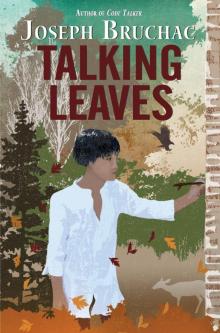 Talking Leaves
Talking Leaves Found
Found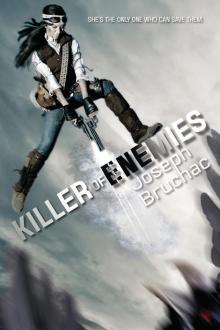 Killer of Enemies
Killer of Enemies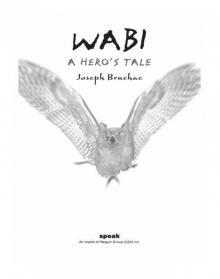 Wabi
Wabi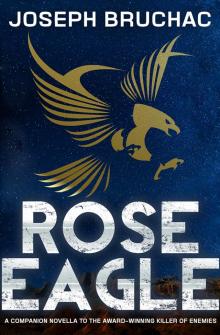 Rose Eagle
Rose Eagle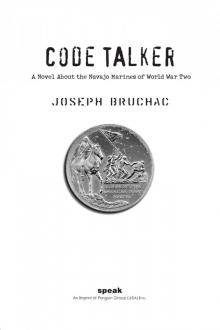 Code Talker
Code Talker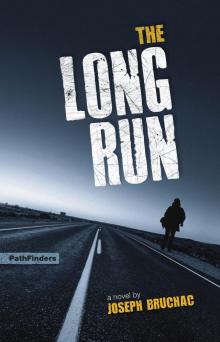 The Long Run
The Long Run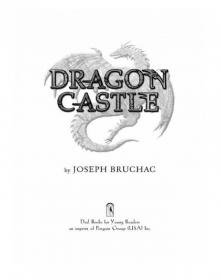 Dragon Castle
Dragon Castle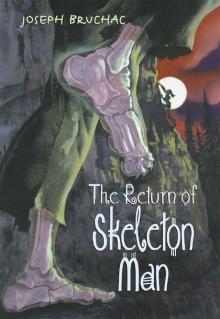 The Return of Skeleton Man
The Return of Skeleton Man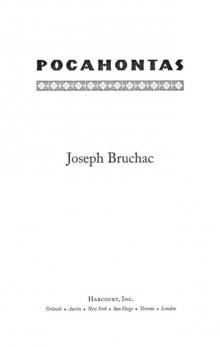 Pocahontas
Pocahontas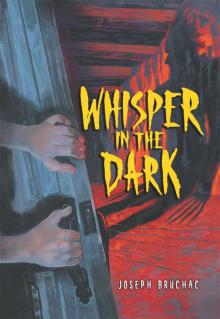 Whisper in the Dark
Whisper in the Dark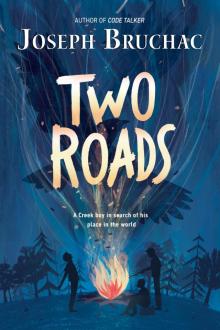 Two Roads
Two Roads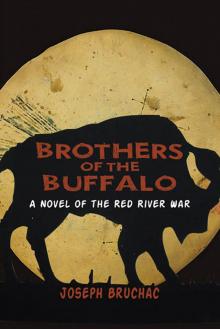 Brothers of the Buffalo
Brothers of the Buffalo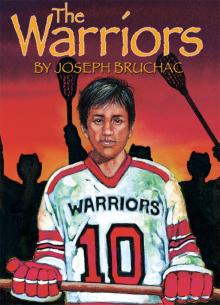 The Warriors
The Warriors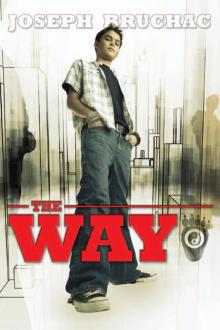 The Way
The Way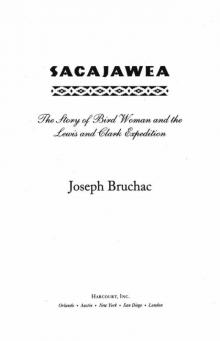 Sacajawea
Sacajawea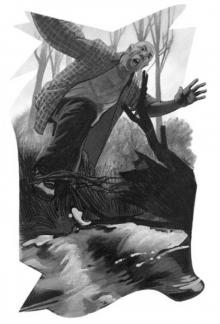 Night Wings
Night Wings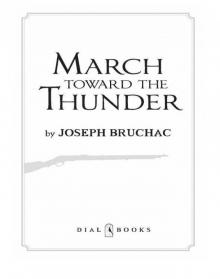 March Toward the Thunder
March Toward the Thunder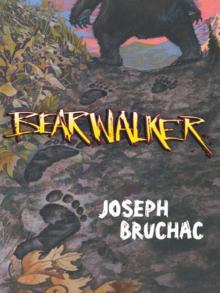 Bearwalker
Bearwalker Skeleton Man
Skeleton Man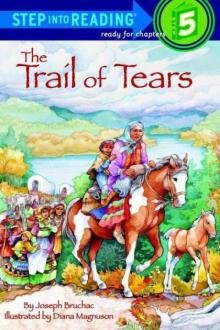 The Trail of Tears
The Trail of Tears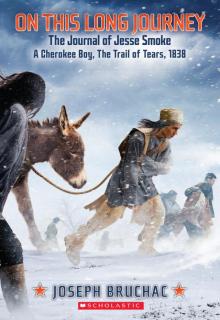 On This Long Journey
On This Long Journey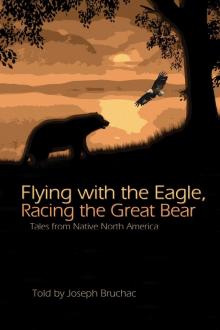 Flying with the Eagle, Racing the Great Bear
Flying with the Eagle, Racing the Great Bear